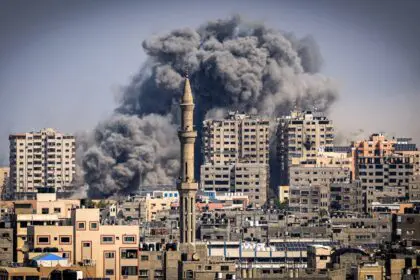Arab states in attendance at the Negev Summit called for a solution to the “Israel-Palestine conflict” and the creation of an independent Palestinian state.

Justin Salhani
Representatives from four Arab League states met with Israeli Foreign Minister Yair Lapid and US Secretary of State Anthony Blinken to discuss issues related to regional security, relations with Iran, and, according to statements from the summit, to advocate on behalf of Palestinians. But while the Palestinians were paid lip service, no Palestinian voices were present at the summit to speak on their own behalf.
The summit comes on the heels of the 2020 Abraham Accords that saw peace deals struck between Israel and four Arab states. Bahrain, Morocco and the United Arab Emirates sent representatives, as did Egypt who was the first country to sign a peace treaty with Israel in 1979. Jordan, who shares official relations with Israel, did not send an envoy.
Arab states in attendance called for a solution to the “Israel-Palestine conflict” and the creation of an independent Palestinian state. These calls were supported by Blinken, who repeatedly named the Palestinians in his public statements with Israeli Prime Minister Naftali Bennett. Of course, the absence of any Palestinians at the table to speak for themselves is a sharp symbol of the power imbalance between Israel and Palestine, with the Palestinian foreign ministry calling the summit a “harsh attack against the Palestinian people.” The Israel-Palestine issue is less an even-handed conflict than it is an occupation and system of apartheid, according to Amnesty International, of the state of Israel over the Palestinians.
In fact, no public statements from the Arab diplomats seemed to address any specific plights of the Palestinian people, such as the recent readoption of the racist marriage law. The law bans Israeli citizens from extending citizenship or residency to Palestinian spouses from the West Bank and Gaza. And despite Blinken’s efforts to repeatedly raise the issue and the steps to take toward a two-state solution, Palestinians still feel like an afterthought to the Biden Administration. The participants of the summit may have also forgotten that Bennett has shown no interest in aiding the peace process.
From the Israeli point of view, this was a summit to build ties against Iranian influence in the region in light of a new US-backed nuclear deal. The deal’s aim is to halt Iran’s nuclear program in exchange for easing up the debilitating sanctions placed on Iran and could potentially remove the US’ terror designation on the Islamic Revolution Guard Corps (IRGC).
“What we are doing here is making history, building a new regional architecture based on progress, technology, religious tolerance, security and intelligence co-operation,” Israeli Foreign Minister Yair Lapid said. “This new architecture, the shared capabilities we are building, intimidates and deters our common enemies, first and foremost Iran and its proxies.”
Regional security cooperation is increasing as Israel plans to send a military officer to Bahrain to join a regional anti-piracy task force. There are also plans to form a regional communication system to warn partner states about incoming drones from Iran or Iranian proxies, the New York Times reported.
Saudi and Emirati infrastructure has come under attack from Yemen’s Houthi rebels, who enjoy Iranian support, in recent months. The UAE and Bahrain used the summit to push for more American involvement and policing in the region, according to the New York Times.
Still, the two Arab states aren’t interested in joining an aggressive Israeli campaign against Tehran, an Arab diplomat who participated in the summit told the Times of Israel. The UAE is building lucrative trade ties with Israel but still maintains relations with Iran.
These developments all point to the larger intention behind such a summit for the Arab states – the consolidation of domestic power by illiberal authoritarians.
Morocco is considered the most democratic of the four states that visited Israel with a ranking of 95 in 2021’s global Democracy Index. Egypt is 132nd, the UAE 134th and Bahrain comes in near the bottom of the world rankings at 144th. Claims by these states that they will be speaking on behalf of Palestinians ring hollow when they don’t provide a space for open expression from their own citizens.
Almost immediately following the summit, Israel publicly backed Morocco’s plan for Western Sahara, according to Reuters, despite the plan facing heavy criticism from Sahrawi independence groups. This is in line with their regional behavior, where the states involved in the summit regularly suppress movements of self-determination and democracy on behalf of autocratic strongmen.
The Emirates originally called for the suspension of plans to annex the West Bank in their conditions for normalization with Israel. But Palestinian officials cast doubt on the Emiratis’ intentions from the start and the UAE has spoken little of Palestinians or the peace process since.
The UAE and Egypt have backed the authoritarian practices of Tunisian President Kais Saied, who has suspended and then dissolved his country’s parliament, and Sudan’s Abdel Fattah al-Burhane, who has suppressed protests leading to thousands of injuries and at least 90 deaths. The UAE also received Syrian President Bashar al-Assad in March 2022, who had been politically isolated since violently cracking down on his own people eleven years earlier. Of course, war crimes are no deterrent for the UAE, be they committed by Assad or Russia’s President Vladimir Putin, as Abu Dhabi has steadfastly refused to condemn the Russian invasion of Ukraine.
Across the Middle East and North Africa, the normalization of relations with Israel is portrayed – by regional powers, Israel and the United States – as a progressive march toward peace. In reality, it is a detriment to all those in the region fighting for liberation from their domestic oppressors. The support for Palestine and Palestinians from Arab states is the same it’s been for decades – all talk and no action. It is the people of the MENA region who lose when countries deemed authoritarian by the global democracy index are relied upon to be their voice. And no people are losing out more from the tightening of relations between these illiberal and undemocratic forces than the Palestinians.
History of the Palestinian-Israeli Conflict
This article is part of our coverage of the history of the Palestinian-Israeli Conflict.
Fanack’s historical record meticulously chronicles the Palestinian-Israeli Conflict in a chronological sequence, encompassing its origins, crises, wars, peace negotiations, and beyond. It is our most exhaustive historical archive.
DISCLAIMER
The opinions expressed in this publication are those of our bloggers. They do not purport to reflect the opinions or views of Fanack or its Board of Editors.



